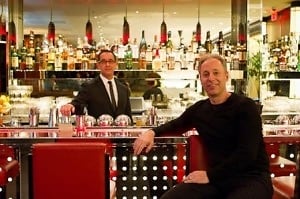 David Rabin, a pioneer of MPD, is itching to enter back into the neighborhood's fray with a new Double Seven. The Lambs Club owner sat down with GofG for an exclusive at his other hotspot, Jimmy, to talk about Double Seven's opening and the nuanced evolution of club life in New York. The former president of the New York Nightlife Association and an experienced club owner, Rabin has a reputation for creating classy rooms with hip vibes. Lotus in many ways helped to break the ice for the development of the MPD in its modern incarnation, and his constant lobbying to defend clubs against curfews and angry neighbors has significantly added to the buoyancy of nightlife in the city.
David Rabin, a pioneer of MPD, is itching to enter back into the neighborhood's fray with a new Double Seven. The Lambs Club owner sat down with GofG for an exclusive at his other hotspot, Jimmy, to talk about Double Seven's opening and the nuanced evolution of club life in New York. The former president of the New York Nightlife Association and an experienced club owner, Rabin has a reputation for creating classy rooms with hip vibes. Lotus in many ways helped to break the ice for the development of the MPD in its modern incarnation, and his constant lobbying to defend clubs against curfews and angry neighbors has significantly added to the buoyancy of nightlife in the city.
Yet he's come up against a few setbacks of late. It became time for the Lotus space to be sold to Abe and Arthur's in June 2008, and his Los Dados hit the Westside prematurely before The Standard and the Highline opened. He missed out on that momentum. To boot, the original Double Seven closed in 2007 after landlord disagreements. Rabin told us over a Diet Coke at Jimmy how he manages his new nightlife aspirations. As he gears up for Double Seven's as-yet-undetermined spring opening, he means business.
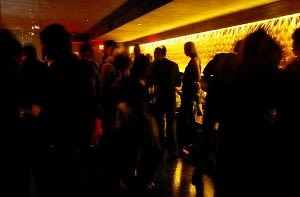 [The old Double Seven, Image via On The Inside]
[The old Double Seven, Image via On The Inside]
GofG: The first incarnation of Double Seven closed in 2007. What does the new Double Seven look like and where is it?
DR: It's at 63 Gansevoort. It looks like the old Double Seven with the crocodile banquettes and these wonderful art pieces by an amazing Brooklyn glass blower named Norman Mooney. He almost smokes the glass; it’s a very haunting piece of art through which light kind of flows through. He uses black smoke like a foggy night. It’s basically a slightly updated and slightly larger version of the old Double Seven. It's a stand alone former garage space. We don't have any upstairs neighbors.
GofG: Your buddy Mark Baker told us recently at the Richie Rich Villionaire show (above) that “nightlife is f*ing boring.” Do you share that opinion? Do you feel you have to use Double Seven to reinvigorate New York nightlife, because it's gotten staid or conventional?
DR:I actually don’t share that opinion. I’m not as caught up in that issue at this moment. I'm not busy assessing what other people are doing. Our places are doing well, our friends are coming to our places, whether it’s The Lambs Club or here [The Jimmy]. I think that people are doing some really cool things in nightlife right now. I’m a rising-tide-lifts-all-boats guy. I think the more good venues that are out there, the better the industry does and it gets people out of their house.
GofG: Of course Double Seven has been much delayed at this point. What are the acrobatics and difficulties of opening a club like this one?
DR: Well, I don’t think the norm would ever be as difficult as Double Seven. The original Double Seven was open starting in 2005 for about 18 months on 14th St. And then our building was sold and it had the right to kick us out, basically. We happened to have a space from Neil Bender, a landlord, who almost immediately as we started the negotiations stage got involved in a lot of legal disputes with his family--the Gottlieb family--as he was the nephew who inherited all of the property. They own like 200 buildings. So we just got caught up in this entire legal mishmosh of his life, and we had to wait for that to settle down until we got the space. So it’s been trying and annoying. It’s not like anyone’s trying to delay us, but it’s taking forever.
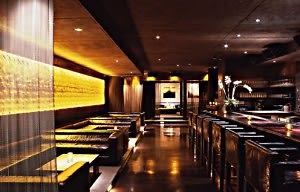 [Double Seven, Image via Nightlife Ratings]
[Double Seven, Image via Nightlife Ratings]
GofG: But do you think the delay put you at any kind of advantage?
DR: Well, on the other hand, had we opened when we thought we’d open, we would’ve opened at the height of the bad economic time. It was the same thing with The Lambs Club. The Lambs Club was very delayed, but in a lot of ways I feel like we opened when the worst was passed, so in a way that was a lucky break. It was a rough year waiting for it to open.
GofG: Indeed, it seems to have worked out. I gather a lot of big players turn up to The Lambs Club on a regular basis. Perhaps that can play out with Double Seven
DR: David Remnick comes in. It's Richard Plepler from HBO, for example. Amy Astley from Teen Vogue is there a lot. Jed Bernstein from Driving Miss Daisy and a lot of major Broadway shows. We see Michael Cohl, a producer from Spider-Man for dinner probably once a week…So it’s a lot o Viacom people. Megan Salt, who’s the director of public relations at Vogue. Anna Wintour's been in the building; she’s not a regular, but she comes by. We'll see who will show up to Double Seven.
GofG: It will be a gamble, and funny enough, I understand you're a betting man. Tell me how that manifests in the name Double Seven and how that instinct's been treating you these days.
DR: No, no Double Seven is not related to poker. It's kind of a random name. We thought it sounded a bit old school/rat pack when Jeffrey Jah first suggested it. I do try to play poker one night a week. We used to run a game in the office above Lotus, but now it’s in an apartment for the Monday night game. It's not nightlife bigwigs. It was in the past more restaurant people, but it’s more random now--hedge fund guys, relatives. I think the game got so serious that it moved away from being just like a fun night. It’s fun-serious. Higher stakes and better players.
GofG: But are you willing to make a wager on when Double Seven will finally open?
DR: We don’t have our liquor license yet. We hope to have that sometime in March, maybe early April. Obviously, we don't want to miss the spring, but we don’t have an opening date yet. We’re not finished with construction. I’m carrying around resumes right now, doing interviews.
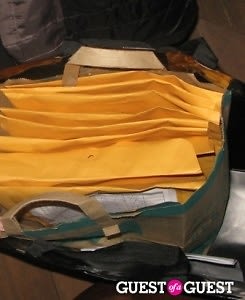 [The resumes for Double Seven employee hopefuls]
[The resumes for Double Seven employee hopefuls]
GofG: For bartenders and general employees? What training will be involved?
DR: Bartenders, everything. All we have in place right now is Andre [Rizo] the GM. He’s the only person who’s been hired. After this much time waiting, it’s not about rushing to get it open. We all want it to be right. The bar program is like Sasha [Petraske] from Milk and Honey, so the bartenders are gonna need several weeks of training. You can’t just open. Making the cocktails, making them right, you know Sasha is--I think he’s arguably the best--in the top three or four guys in the country. Milk and Honey was really the genesis for Double Seven. I used to go to Milk and Honey and be like, "Wow these are the best drinks of my life."
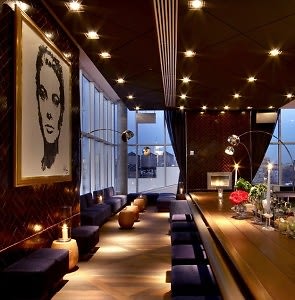 GofG: Who's going to be the doorman for Double Seven?
GofG: Who's going to be the doorman for Double Seven?
DR: That's always a challenging position. It's a small venue with four partners, so it has to be someone who knows who our friends are but can be really polite to people there's just no room. On any night, we can fill it with all our own friends. It's very easy to over-crowd it and make it uncomfortable.
You have to prepare for the evolution. I don't want anyone to walk away from Double Seven feeling like "they're just jerks." I want them walking away feeling like, "All right, I get it, it's over crowded, they have a lot of friends coming down."
GofG: What kinds of people do you want to come to the club? Is it twenty-something hipsters, or is it an older crowd?
DR: You know I’ve learned: I’ve opened enough places that I’ve learned you can’t dictate who’s gonna come to your venues, you know you have one thing in mind and they may or may not choose to come there. It’s a beautiful space, and I don’t have too many preconceived notions about who’s gonna come there yet. It took three years of a latency period, to incubate if you will.It will develop it in its own way.
GofG: What vibe are you going for? Do you feel out of touch with the Meatpacking District?
DR: I haven’t worked in the Meatpacking District in three years, so I don’t really know what’s going on as much as I did. I don’t have my finger on the pulse there like I used to, but I’m not that worried about it, honestly. I don’t look at it as a club, really, I look at it as a 120 person bar. There's no dancing. We didn't apply for a cabaret license. There's no space for it the way the furniture's laid out. It's a cocktail bar, cocktail lounge.
GofG: Ultimately you're going for quality but not trying to reinvent New York nightlife?
DR: I don’t know that New York nightlife needs reinventing, I think there’s plenty of people doing interesting things for different audiences. You know, the person who loves Hogs and Heifers is not going to love Double Seven. The person who likes to go hang out in a bar in Brooklyn will care less about Double Seven, but I’m sure that people would have a great night in Brooklyn or Astoria…so I think there’s a lot of stuff going on in a lot of venues maybe outside the normal circle that we sort of traditionally run around in.
GofG: In many ways this is your great return to the Meatpacking District. They've called you the mayor of the MPD: are you ready to regain that position?
DR: I do not call myself the Mayor, never have, never will.. We did get there first. And, I started this thing called the Meatpacking District Initiative in 2003 which was a way to organize all the different store owners. Look at it now. There are 40 or 50 venues now, and more are coming. It's exciting to go back to the neighborhood.
It's certainly nice to walk around and see a very functional ecosystem. You know, there are still meatpackers there. From 3am to 11 a.m. there are meatpackers, from 11 a.m. to 7 p.m. at night there are stores and businesses. And from 7p.m. to 3 a.m. there are all those restaurants and bars and nightlife. So, It's really one of those few, undisturbed ecosystems. And we've been able to convince the politicians over time to leave it alone and let it prosper.
I think over 70% of people who come to NY for vacation cite nightlife as being one of the main reasons they come. If you study about it, it becomes part of a politician's verbiage when they're not on another topic. We have to nurture it.
[Double Seven Is Almost There: Who's Feeling Lucky?]
[Mark Baker Thinks New York Nightlife Is Boring: Sees Resurgence With Double Seven]
[Top image via ny.eater]


.jpg)
.jpg)



.jpg)
.jpg)
.jpg)

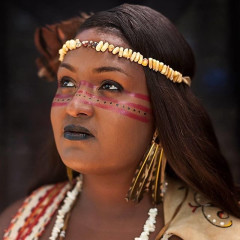
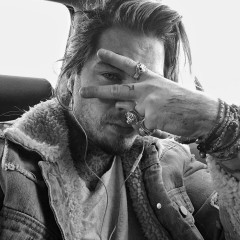

.jpg)